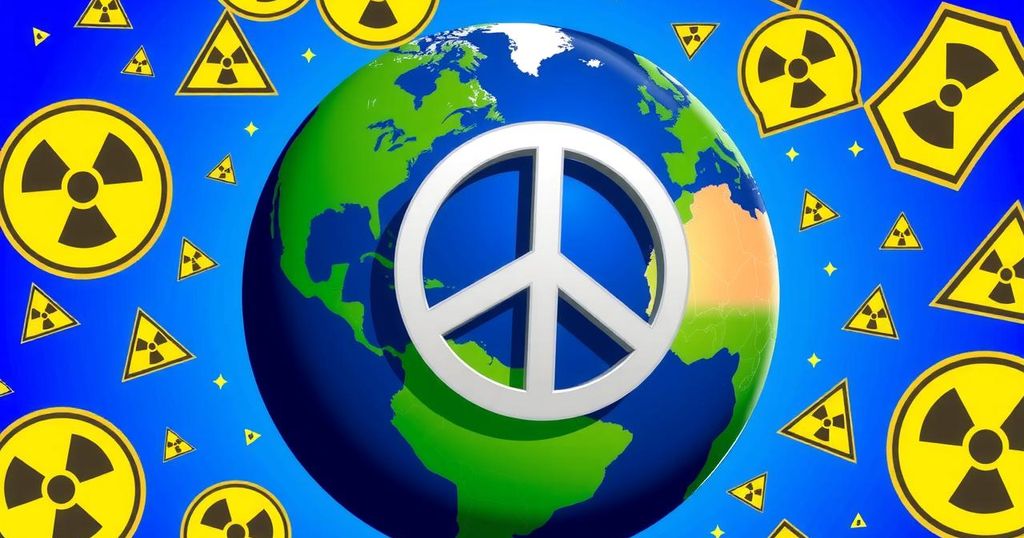President Trump’s strategy on Iran includes the choice of military action or negotiation. He expressed support for the Iranian people while pushing for a diplomatic solution to prevent nuclear development. Iran’s Supreme Leader rejected outreach, fearing U.S. demands might extend beyond nuclear issues. Russian influence complicates negotiations, as Putin’s control appears to guide Iran’s actions. With joint military exercises between Israel and the U.S., urgent actions are needed to counter Iranian threats effectively.
On March 7, during an interview with Maria Bartiromo on Fox Business Network, President Donald Trump articulated his strategy regarding Iran, stating there are two options: a military approach or negotiating a deal. He expressed concern for the Iranian populace, whom he characterized as “great people” suffering under a detrimental regime that violently suppresses dissent. Trump also indicated that he had tasked Iran’s Supreme Leader Ali Khamenei with a letter proposing a diplomatic solution to prevent Iran from developing nuclear weapons.
In response, Khamenei rejected Trump’s letter, dampening hopes within the Iranian regime that negotiations might alleviate their economic difficulties. He cautioned that the United States would not confine discussions to atomic armament but would also impose further demands related to Iran’s defense capabilities and its regional influence, particularly alluding to the Islamic Revolutionary Guard Corps’ missile program and associated terrorist networks.
Russian diplomat Mikhail Ulyanov echoed Khamenei’s sentiment, asserting that negotiations should not incorporate Iran’s missile capabilities or its geopolitical activities. Russia’s approach appears to be facilitating a U.S.-Israel military strike on Iran’s nuclear sites, intending to relieve global pressures on Iran post-attack, while enabling Moscow to reassert dominance over Iran’s resources.
The degree of Russian influence over Iran raises questions, especially given Khamenei’s historical ties to Moscow. Following his assumption of supreme leadership, U.S. Ambassador Smith Hempstone had warned that Khamenei might prefer an alliance with the Soviet Union over the United States, citing his educational background at Moscow’s Patrice Lumumba University.
Furthermore, a 2010 confirmation by Russian State TV highlighted Khamenei as a significant alumnus of this university, with Dr. Ilan Berman noting that many of Iran’s most hardline figures were educated in the Soviet Union. Under President Vladimir Putin, Russia continues to employ strategies reminiscent of the Soviet era, utilizing proxy forces against U.S. and Israeli interests.
Recent disclosures, including leaked audio from Iranian Foreign Minister Mohammad Javad Zarif, demonstrated Putin’s substantial control over Iranian military actions, illustrating his directive influence on the IRGC and its operational decisions. According to reports, under Trump’s maximum pressure strategy, Iran signaled a willingness for specific nuclear discussions, aligned with Russian directives.
Despite this, history indicates that when external pressures on the Iranian regime are alleviated, they swiftly return to financing terrorism through their oil revenues, thereby threatening U.S. allies and plotting further international attacks. Trump emphasized the urgency of the situation, suggesting that significant developments concerning Iran would transpire imminently.
Simultaneously, reports emerged of Israel conducting military exercises in conjunction with U.S. forces, highlighting a cooperative stance aimed at neutralizing Iran’s nuclear ambitions. However, should the Iranian regime endure and sanctions be lifted, Iran stands to gain substantial resources to bolster its defenses and influence.
In summary, President Trump’s approach to Iran highlights the delicate balance between military action and diplomacy. Despite efforts for negotiation, Iran’s leadership has resisted, indicating their intentions to maintain their defensive and regional strategies. Russia’s involvement complicates the scenario, with historical ties to Iran becoming increasingly relevant. The window for action is shrinking, with potential consequences for regional stability and international security, particularly if sanctions are lifted, enabling Iran to rebuild its capabilities.
Original Source: www.foxnews.com




